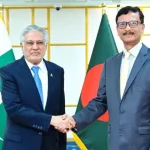LAHORE – Four members of the self-styled Islamic State group have been arrested during a successful operation in Lahore’s Iqbal Town, a counter official told The Nation yesterday.
The security and law enforcement agencies jointly conducted the raid on Ya-Rasool-Ullah Park located near Moon Market in Iqbal Town on a tip off, he said. The official confirmed the arrests but did not mention further details because of security reasons. It was not clear yet how the suspects were identified as affiliated with the Islamic State group.
A spokesperson for the Punjab’s counter terrorism department said the militants were plotting large-scale terror attacks to target government installations and senior officials in Lahore. “A big terrorism plan of DAESH (has been) foiled. The terrorists had planned to kill officials on a large scale,” the spokesperson said while referring to the Middle-East based Islamic State group. The counter terror operatives also seized 1600 gram explosives, 8 safety fuse, and four non-electric detonators from their possession.
The terror suspects were named by the CTD as Syed Abdul Alam, Muhammad Hafeez-ur-Rehman, Nisar Ahmed, and Tassawar Amin. They were shifted to an unknown facility for further interrogation. According to officials, the raid was conducted near Lahore’s leading Moon Market, where more than 60 people mostly women and children had been killed in twin suicide blasts in December 2009.
Perhaps, it was for the first time that the Punjab’s counter terrorism department officially named the terrorists as members of the Deash, which controls large swaths of Iraq and Syria. “A team of Lahore CTD and officers of a sensitive agency jointly got a source information that terrorists belonging to proscribed organization DAESH were planning to attack government installations in Lahore and (they) were about to launch the attack,” the spokesman says.
The move comes just a few weeks after Pakistan Army declared that it had foiled Islamic State’s attempts to establish operations in the country. According to the military spokesman, they had arrested more than 300 militants and their sympathisers including 20 core organisers during the countrywide operations.
In November 2014, Lahore police had launched a manhunt to track down elements behind an “ISIS campaign” after discovering distribution of pamphlets and display of posters on the boundary walls and roadside poles in some parts of the city. Later, the provincial police officer had denied the presence of the terror outfit in the Punjab province stating that there was no such “organized group” operating in the province.
In early August, Jamaat-ul-Ahrar, an offshoot of the Pakistani Taliban having links with ISIS, claimed the responsibility for the attack on lawyers and journalists in Quetta. More than 70 people mostly lawyers died in the horrific blast that ripped through the emergency ward of the civil hospital.
The same group was behind the deadliest attack in the country so far this year; the suicide attack in a crowded Lahore park that killed 75 people on Easter Sunday in March. After claiming responsibility for the Gulshan-i-Iqbal park blast, the Jamaat-ul-Ahrar declared the start of a new terror campaign, “Sound of Thunder”. The group posted an Urdu communiqué on its Facebook page early this year claiming that Christians were the prime target. The post also carried a photo of the bomber, identifying him as Salahuddin Khorasani.
Security experts say they believe the Quetta blast was identical to Lahore attack. “The modus operandi was the same. Again, they selected a soft target. They used lethal combination (of explosives) to inflict maximum casualties.”





